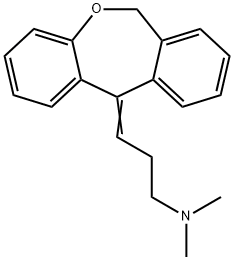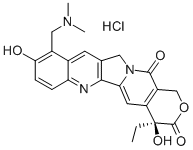Doxepin hydrochloride
Synonym(s):11-(3-Dimethylaminopropylidene)-6,11-dihydrodibenz[b,e]oxepine hydrochloride
- CAS NO.:1229-29-4
- Empirical Formula: C19H22ClNO
- Molecular Weight: 315.84
- MDL number: MFCD00079135
- EINECS: 214-966-8
- SAFETY DATA SHEET (SDS)
- Update Date: 2025-12-17 17:32:32

What is Doxepin hydrochloride ?
Description
Doxepin is a tricyclic antidepressant that binds to the serotonin (5-HT) transporter (SERT) and norepinephrine transporter (NET; Kds = 68 and 29.5 nM, respectively). It is a histamine H1 receptor antagonist (Ki = 1.23 nM). Doxepin selectively binds to SERT and NET over the dopamine transporter (DAT; Kd = 12,100 nM) and inhibits histamine H1 over H2, H3, and H4 receptors (Kis = 170, 39,810, and 15,135 nM, respectively). It also binds to the 5-HT2 receptor, as well as to muscarinic acetylcholine and α1-adrenergic receptors (α1-ARs; Kds = 27, 23, and 23.5 nM, respectively). Doxepin (10 mg/kg, i.p.) decreases allodynia and hyperalgesia in a mouse model of chronic constriction injury-induced neuropathic pain. It increases the distance traveled in the center of the open field test and reduces immobility time in the forced swim test in a mouse model of depression induced by chronic stress when administered orally at a dose of 15 mg/kg. Formulations containing doxepin have been used in the treatment of depression and insomnia.
Chemical properties
White Solid
Originator
Sinequan,Pfizer,US,1969
The Uses of Doxepin hydrochloride
Doxepin hydrochloride is a tricyclic antidepressant that inhibits the reuptake of serotonin and norepinephrine and acts as an antagonist at histamine, serotonin, adrenergic, and muscarinic receptors with Ki values in the nanomolar range.It is a antidepressant used clinically to treat anxiety and depression.
The Uses of Doxepin hydrochloride
Doxepin hydrochloride is used clinically to treat anxiety and depression. Doxepin is an antidepressant.
Indications
Doxepin (Sinequan, Adapin) is a tricyclic antidepressant with potent H1 and H2 antagonistic effects. It also has antimuscarinic, antiserotonic, and anti-α-adrenergic activity. Use of 10 to 50 mg PO t.i.d. to q.i.d. has been shown to be effective in the treatment of primary acquired, chronic idiopathic urticaria, idiopathic cold urticaria, and for patients with anxiety or depression associated with their urticaria. Sedation and dry mouth are the most common side effects. Doxepin may interact with other drugs that are metabolized by the cytochrome P-450 system (ketoconazole, itraconazole, erythromycin, clarithromycin, etc.).
Definition
ChEBI: Doxepin Hydrochloride is a dibenzooxazepine.
Manufacturing Process
(A) Preparation of 3-bromopropyltriphenylphosphonium bromide:
Triphenylphosphine, 1.0 kg, and 770 grams of 1,3-dibromopropane are
dissolved in 2.0 liters of xylene and the solution is stirred under a nitrogen
atmosphere at 130°C. After 20 hours the mixture is cooled, and the crystalline
product, which precipitates, is collected and washed with 20 liters of benzene.
After drying in vacuo the product weighs 1,578 grams, MP 229°-230°C;titration for bromide ion: Found, 17.1%; calculated, 17.2%.
(B) Preparation of 3-dimethylaminopropyltriphenylphosphonium bromide
hydrobromide: A solution of 595 grams of anhydrous dimethylamine and
1,358 grams of 3-bromopropyl-triphenylphosphonium bromide in 4 liters of
ethanol is warmed to 70°C until solution is complete and the solution then is
allowed to stand at room temperature for 20 hours. Volatile components are
removed by distillation in a vacuum and the residue is suspended in 2.0 liters
of ethanol and is redistilled to remove excess amine. The residue is dissolved
in 3.0 liters of warm ethanol and gaseous hydrogen bromide is passed into
the solution until the mixture is acidic. After filtration the solution is
concentrated to a volume of 3.0 liters, is cooled, whereupon the product
precipitates, and the precipitate is collected; it weighs 1,265 grams, MP 274-
281°C. Recrystallization from ethanol raises the MP to 280.5°-282.5°C.
Bromide ion titration: Found, 31.2%; calculated 31.3%.
(C) Preparation of doxepin: 1,530 grams of the product from step (B) is
suspended in 4.5 liters dry tetrahydrofuran and 6.0 mols of butyl lithium in
heptane is added during 1 hour. After an additional 30 minutes, 483 grams of
6,11-dihydrodibenz-(b,e)oxepin-11-one, prepared as described in Belgian
Patent 641,498, is added to the deep red solution and the reaction was
maintained at reflux for 10 hours. Water, 500 ml, is added at room
temperature and the solvent is removed in vacuo. The crude residue is treated
with 10% hydrochloric acid until acidic (pH 2) and then 1.5 liters benzene is
added. After stirring, the mixture separates into 3 phases (an insoluble
hydrochloride salt product phase, an aqueous phase and an organic phase).
The benzene layer is removed by decantation and the remaining mixture is
rendered basic with 10% sodium hydroxide solution and is extracted with
three 1,500 ml portions of benzene. The benzene extracts are washed, then
dried with anhydrous sodium sulfate and concentrated in a vacuum leaving a
residue of 1,530 grams, gas and thin layer chromatography analysis show this
to be a cis/trans mixture (approx. 4:l) of 11-dimethylaminopropylidene-6,11-
dihydrodibenz-(b,e)oxepin (90% yield). This mixture has substantially more
activity pharmacologically than the cis/trans mixture obtained by the Grignard
route disclosed in the Belgian Patent 641,498. This base is then converted to
the hydrochloride with HCl.
brand name
Sinequan (Pfizer); Zonalon (Bradley).
Therapeutic Function
Tranquilizer
General Description
Doxepin, 3-dibenz[b,e]-oxepin-11(6H)ylidine-N,N-dimethyl-1-propanamine hydrochloride, N,N-dimethyl-3-(dibenz[b,e]oxepin-11(6H)-ylidene)propylamine (Sinequan, Adapin), isan oxa congener of amitriptyline, as can be seen from itsstructure.
The oxygen is interestingly placed and should influenceoxidative metabolism as well as postsynaptic and presynapticbinding affinities. The (Z)-isomer is the more active, althoughthe drug is marketed as the mixture of isomers. Thedrug overall is a NE and 5-HT reuptake blocker with significantanticholinergic and sedative properties. It can be anticipatedthat the nor- or des- metabolite will contribute to theoverall activity pattern.
Biochem/physiol Actions
Tricyclic antidepressant that is a more potent inhibitor of norepinephrine uptake than of serotonin uptake; antagonist at H1 histamine, muscarinic cholinergic, and α-adrenoreceptors.
Veterinary Drugs and Treatments
The primary use for doxepin in veterinary medicine is the adjunctive therapy of psychogenic dermatoses, particularly those that have an anxiety component. Its efficacy as an antihistamine for atopic dermatoses is in question.
in vitro
doxepin was a moderately potent competitive inhibitor of serotonin uptake in human blood platelets in vitro, with an inhibitory constant ki of ~0.2 μm. doxepin (100 μm) rapidly increased the efflux of serotonin from platelets [1].
in vivo
in rats and dog, oral administration of doxepin was well absorbed and quickly appeared in the blood. numerous metabolites of doxepin were observed in liver and in urine, only doxepin and demethyl doxepin were found in the rat brain[3]..
Mechanism of action
Doxepin hydrochloride is a potent and selective histamine receptor H1 antagonist. Doxepin hydrochloride is also a potent CYP450 inhibitor and significantly inhibits CYP450 2C19 and 1A2. Doxepin inhibits reuptake of serotonin and norepinephrine as a tricyclic antidepressant.
References
[1] lingjrde o. effect of doxepin on uptake and efflux of serotonin in human blood patelets in vitro[j]. psychopharmacology, 1976, 47(2): 183-186.
[2] hill s j, ganellin c r, timmerman h, et al. international union of pharmacology. xiii. classification of histamine receptors[j]. pharmacological reviews, 1997, 49(3): 253-278.
[3] hobbs d c. distribution and metabolism of doxepin[j]. biochemical pharmacology, 1969, 18(8): 1941-1954.
[4] hajak g, rodenbeck a, voderholzer u, et al. doxepin in the treatment of primary insomnia: a placebo-controlled, double-blind, polysomnographic study[j]. journal of clinical psychiatry, 2001, 62(6): 453-463.
[5] feighner j p, cohn j b. double-blind comparative trials of fluoxetine and doxepin in geriatric patients with major depressive disorder[j]. the journal of clinical psychiatry, 1985, 46(3 pt 2): 20-25.
[6] goldsobel a b, rohr a s, siegel s c, et al. efficacy of doxepin in the treatment of chronic idiopathic urticaria[j]. journal of allergy and clinical immunology, 1986, 78(5): 867-873.
Properties of Doxepin hydrochloride
| Melting point: | 187-189°C |
| Flash point: | 9℃ |
| storage temp. | 2-8°C |
| solubility | 1 M HCl: 50 mg/mL |
| form | powder |
| color | white to off-white |
| Water Solubility | Soluble in water (100 mM), chloroform (1:2), alcohol (1:1), methanol, and DMSO. |
| λmax | 298nm(lit.) |
| Merck | 14,3435 |
| Stability: | Store in Freezer at -20°C |
| CAS DataBase Reference | 1229-29-4(CAS DataBase Reference) |
Safety information for Doxepin hydrochloride
| Signal word | Danger |
| Pictogram(s) |
 Skull and Crossbones Acute Toxicity GHS06 |
| GHS Hazard Statements |
H301:Acute toxicity,oral |
Computed Descriptors for Doxepin hydrochloride
| InChIKey | MHNSPTUQQIYJOT-SJDTYFKWSA-N |
Doxepin hydrochloride manufacturer
New Products
Indole Methyl Resin tert-butyl 9-methoxy-3-azaspiro[5.5]undecane-3-carboxylate Boc-His(Boc)-OH 2-CTC Resin 4-Chloro-7-tosy1-7Hpyrrolo[2,3-d]pyrimidine 5,7-Dibromo-1H-indole 2,5-dichloro-N-hydroxy-4,6-dimethylpyridine-3-carboximidamide 2,2-Dimethoxy-7-azaspiro[3.5]nonane hydrochloride 4-chloromethyl-5-methyl-1,3-dioxol-2-one (DMDO-Cl) R-2-BENZYLOXY PROPIONIC ACID 1,1’-CARBONYLDIIMIDAZOLE 1,1’-CARBONYLDI (1,2-4 TRIAZOLE) N-METHYL INDAZOLE-3-CARBOXYLIC ACID 4-((2-hydroxyethyl)thio)benzoic acid 1-(TERT-BUTOXYCARBONYL)-2-PYRROLIDINONE Methyl 6-methylnicotinate 3-Pyridineacrylic acid tert-Butyl carbazate TETRAHYDRO-2H-PYRAN-3-OL 2-((4-morpholinophenylamino) (methylthio) methylene) malononitrile 3-(4-morpholinophenylamino)-5-amino-1H-pyrazole-4-carbonitrile 2,4-dihydroxybenzaldehyde 1,3-Diethyl-1,3-Diphenylurea Methyl 2-methylquinoline-6-carboxylateRelated products of tetrahydrofuran



![(-)-2-[METHYLAMINO]-1-PHENYLPROPANE](https://img.chemicalbook.in/CAS/GIF/33817-09-3.gif)



![11[6H]-[3-(METHYLAMINO)PROPYLIDENE]DIBENZ[B,E]OXEPINE HYDROCHLORIDE](https://img.chemicalbook.in/CAS/GIF/2887-91-4.gif)
You may like
-
 1229-29-4 DOXEPIN HYDROCHLORIDE EP 99%View Details
1229-29-4 DOXEPIN HYDROCHLORIDE EP 99%View Details
1229-29-4 -
 1229-29-4 98%View Details
1229-29-4 98%View Details
1229-29-4 -
 Doxepin hydrochloride 98%View Details
Doxepin hydrochloride 98%View Details
1229-29-4 -
 1229-29-4 Doxepin hydrochloride 98%View Details
1229-29-4 Doxepin hydrochloride 98%View Details
1229-29-4 -
 Doxepin HCl 95% CAS 1229-29-4View Details
Doxepin HCl 95% CAS 1229-29-4View Details
1229-29-4 -
 Doxepin Hydrochloride (mixture of isomers) CAS 1229-29-4View Details
Doxepin Hydrochloride (mixture of isomers) CAS 1229-29-4View Details
1229-29-4 -
 Doxepin hydrochloride CAS 1229-29-4View Details
Doxepin hydrochloride CAS 1229-29-4View Details
1229-29-4 -
 Thiourea 99% ARView Details
Thiourea 99% ARView Details
62-56-6
